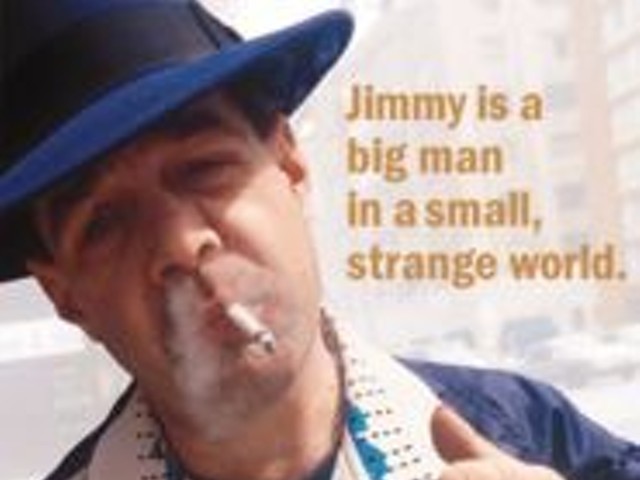It can't stop acting like a gorilla.
In the past week, a small news story illuminated a big problem for the St. Louis area's challenged animal-control efforts: The Humane Society refuses to lower itself to work with the many other good-hearted groups and individuals trying to save dogs and cats in the area.
At issue is a grant application -- no, make that a pre-application -- that a tiny group called Stray Rescue is trying to make toward the goal of eliminating the killing of healthy and adoptable dogs and cats. Stray Rescue wants to apply for a $4 million grant from Maddie's Fund, a $200 million foundation established by David and Cheryl Duffield, co-founders of e-commerce giant PeopleSoft.
To receive a Maddie's Fund grant, a no-kill animal-protective group has to get the other groups dealing with strays in its area (no-kill or otherwise) to agree to work together on a five-year plan to reduce -- and eventually eliminate -- euthanasia of adaptable animals. Broad-based cooperation among community groups is a key to winning a grant.
Over a two-year quest, Stray Rescue founder and director Randy Grim has rounded up the support of eight other animal-welfare organizations in the city, the local veterinary association, seven veterinary hospitals and the city's Animal Regulation Center. But he has come up short.
The Humane Society of Missouri is refusing to participate. In fact, says Grim, its officials won't even meet with him to discuss the proposal.
So long, Maddie's Fund grant, for now.
How can this be? Why would an organization in the business of saving animals be so quick to turn up its nose at millions in new resources for that very purpose? Why would it snub every other animal-protective group in the city in the process?
Through a spokesperson, the Humane Society has claimed that a Maddie's Fund grant would force it to accept only animals fit for adoption and that it would be turning away 50,000 animals as a consequence. But Grim points out, most persuasively, that his proposal is confined to the city limits, where, he says, fewer than 5,000 animals are put to sleep each year.
In reality, a Maddie's Fund grant would only affect the Humane Society in three ways, according to Grim:
One, it would have to report its euthanasia numbers along with all the other shelters, because accountability and attainment of numeric goals are linchpins of the foundation's approach.
Two, it would have to agree -- like the other shelters -- to turn over healthy, adoptable, nonvicious animals for which it has no space (and therefore would otherwise have to euthanize) to other animal-protective groups.
Three, it would have to abide by the group's goals of reducing and ultimately eliminating the need to put dogs and cats to sleep.
It's hard to imagine that any of those points should be so difficult for the Humane Society to accept, but the best guess is that the first one -- accountability for its numbers -- is the one that the tight-lipped organization finds most troubling. Despite its constant media presence -- richly deserved, by the way -- as a major public asset providing care to animals, widespread education and the like, the Humane Society clings to its privacy.
That's quite a paradox.
On one hand, you have the fourth-largest organization of its kind in the nation, with an endowment of more than $50 million and an annual budget of more than $8 million, doing essential and high-profile work to contribute to the public health and safety. On the other hand, you have a private nonprofit group that feels no compulsion to answer in any respect to the public, much less to its fellow animal-protective organizations.
This wouldn't be so troubling if the need to combat animal overpopulation wasn't such a pressing public problem and if one organization wasn't garnering such an overwhelming share of the resources available to address it. But that's precisely what's happening here.
Last month, the tragic death of 10-year-old Rodney McAllister, who was mauled in the city by stray dogs, spoke volumes about the public-health side of the crisis. But it shouldn't take a child's death to muster public outrage over a situation that was out of control in the first place. More than 40,000 dogs and cats -- most of them healthy and adoptable -- are reportedly put to sleep every year in the St. Louis area.
Private or not, the Humane Society should be expected to answer legitimate public criticism over its failure to do as much as its counterparts in many other cities with regard to spay/neuter efforts in low-income areas. It should be held to task for bad judgment calls, such as the one it made a few years ago in turning down an offer from its own auxiliary to purchase a mobile spay/neuter clinic.
And for good measure, the Humane Society might have its president and executive director, Kathy Warnick, emerge into public view occasionally rather than leave all statements to a spokesperson. Ms. Warnick should be occupying a bully pulpit on issues involving animal health and safety, yet she is virtually nonexistent in the media.
By and large the Humane Society is an outstanding organization, a civic treasure that does so much good for so many people and animals. But that's all the more reason for it to reach out, not only to the public but to other groups and individuals equally committed to doing good works.
An issue such as the Maddie's Fund grant proposal raises legitimate arguments over how to handle animal overpopulation, and it should never be implied that agencies such as the Humane Society, which perform euthanasia, are the bad guys merely because they put animals to sleep. There's no doubt that they do things properly and humanely.
But can they say the same for how they treat others in the animal-protective community?
Not as long as they're acting like King Kong.





